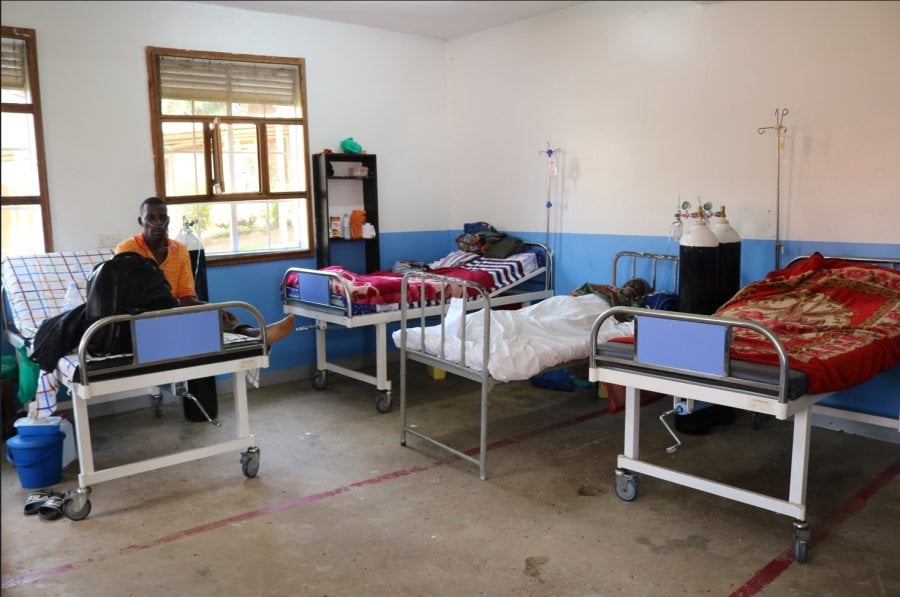Ms. Wanyenze Lucy, clinical officer, Entebbe Regional Referral Hospital

In September 2020, the MRC/UVRI and LSHTM Uganda Research Unit donated 80 hospital beds with drip stands and mattresses; 21 patient monitors and; 30 oxygen cylinders and accessories to the Entebbe Regional Referral Hospital with the aim of boosting the hospital’s COVID-19 response.
As a Ministry of Health designated COVID-19 treatment center, the hospital’s in-patient services had been stretched beyond limits. Equipped with only 100 immobile beds, less than 10 oxygen cylinders, and labor-intensive patient monitoring equipment (such as, handheld blood pressure machines and temperature guns), and lean staffing, the hospital was unprepared to cope with the constant needs of the hundreds of patients admitted on its wards at the peaks of the previous COVID-19 waves.
Sr. Jarasa Christine Ritah, the Deputy Principal Nursing Officer at the hospital reflects on a critical time during the pandemic when constraints at the hospital had severely affected the efficiency of service delivery. She says,
‘We had less than 10 oxygen cylinders and only 2 functional oxygen pipes at the hospital, yet we had hundreds of COVID-19 patients to attend to. We had over 170 COVID-19 patients at one point during the crisis but hospital beds and COVID-19 testing equipment were scarce. This increased the burden on dedicated hospital staff and yet there was no adequate technology. There was a time that patient minders were sleeping on floors and overnight staff would rest on office chairs.
Staff morale was very low because doctors could not monitor vital signs of all intensive care patients easily with the old patient monitors, and they were very drained physically. Although we received a donation of patient monitors from the Ministry of Health, it was not enough to cover every ward.
The costs of treatment were so high that at one point we required patients’ attendants to bring their own oxygen cylinders and regulators on admission, which was unfair to the poor.’
According to Sr. Jarasa, the donation of essential equipment from the MRC/UVRI and LSHTM Uganda Research Unit was timely and not only strengthened operations during the critical phases of the pandemic, but strengthened the hospital’s capacity for effective long-term quality service delivery.
‘The beds provided by the Unit were comfortable, safe, and stable enough to provide an ideal resting place for patients to recover. The built-in drip stands and great positional versatility allowed us to respond to the needs of patients with breathing problems during the crisis. Their arrival also freed up some old beds for use by nurses who had to stay at the hospital full time during the crisis.
Since then, every medical ward has been equipped with 3-8 modern hospital beds with adjustable settings, which has helped to manage cases of with breathing difficulties. Also, every ward has one modern patient monitor, for efficient and timely patient care. Nowadays, staff attend to 50 patients per day on average, an increase from 20 patients per day when vital signs had to be checked separately using handheld blood pressure machines and temperature guns.
With the establishment of an on-site oxygen plant and presence of sufficient cylinders, we were able to set up two Intensive Care Units. One unit is housed in the Hospital to handle regular emergencies, while the other is housed in a separate Isolation Centre set up to cater for high risk cases, such as COVID-19 patients, among others. Now that we have additional cylinders, we are also able to have up to 20 patients at a time on oxygen.’
The MRC/UVRI and LSHTM Uganda Research Unit is an internationally recognized centre of excellence for research on HIV, emerging and re-emerging infections and Non-communicable diseases. Our vision is to build on past research achievements, and new opportunities, to contribute to the control of the HIV epidemic, other infectious diseases, and non-communicable diseases, in Uganda, the region and the world.
Our postgraduate taught courses provide health practitioners, clinicians, policy-makers, scientists and recent graduates with a world-class qualification in public and global health.
If you are coming to LSHTM to study a distance learning programme (PG Cert, PG Dip, MSc or individual modules) starting in 2024, you may be eligible for a 5% discount on your tuition fees.
These fee reduction schemes are available for a limited time only.
